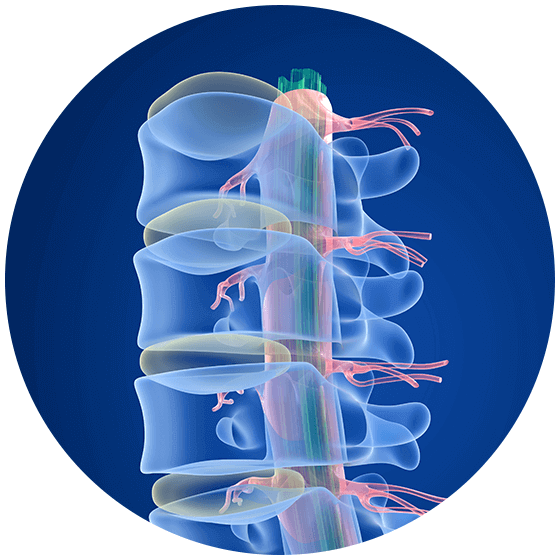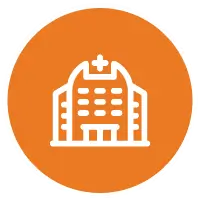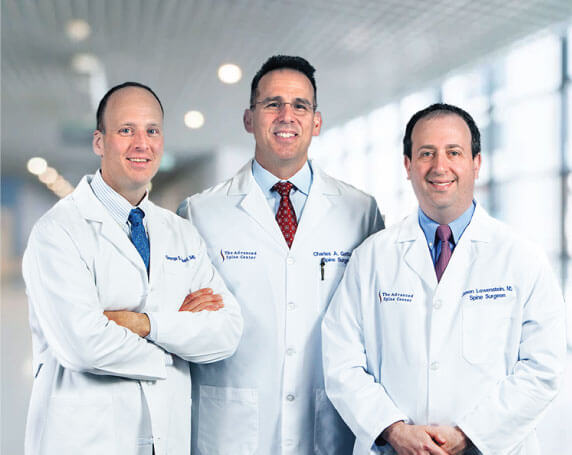Bulging Disc Treatment in New Jersey & New York
Get comprehensive bulging disc treatment using the latest minimally invasive techniques. Don't let bulging disc pain control your life – schedule your consultation today and discover your path to pain relief.

What is a Bulging Disc?
A bulging disc occurs when one of the 23 intervertebral discs in your spine extends beyond its normal boundaries between the vertebrae. Imagine pressing a water balloon between two books — eventually, the balloon bulges out at the sides. That’s similar to what happens when a spinal disc is compressed and begins to protrude. This condition affects millions of Americans and can cause significant pain and mobility issues.
Your spinal discs serve two critical functions: shock absorption and flexibility. They cushion your spine during daily activities and movement while allowing your spine to bend, twist, and move naturally. Each healthy spinal disc consists of the annulus fibrosus (the tough, outer ring) and the nucleus pulposus (the gel-like center that provides cushioning).
When a bulging disc develops, the outer wall weakens, causing the inner gel to push outward. This creates a protrusion that can press against nearby spinal nerves, leading to pain, numbness, and other symptoms. The condition typically develops gradually through everyday wear and tear, though sudden injuries can also cause disc bulging.
If too much pressure builds up in the disc, the soft center can push out through a tear in the outer layer. This is called a slipped or herniated disc, and it happens when the disc breaks open and the inner part leaks out.
Symptoms and Signs of a Bulging Disc
The signs and symptoms of a bulging disc can vary depending on the location and severity of the condition, or you may have no symptoms at all. The degree of a present symptom can also vary widely. The type and extent of the symptom of a bulging disc largely depend on whether the bulging disc is pressing against nearby nerves and which nerves are affected.
Common bulging disc symptoms include:
- Radiating pain that travels along nerve pathways into your arms or legs
- Numbness, tingling, or burning sensations
- Muscle weakness in the arms or legs
- Pain that worsens with certain movements like bending, lifting, or twisting
- Low back (lumbar) bulging discs can often lead to sciatica.
The severity of symptoms can fluctuate throughout the day and may be influenced by your activities, posture, and lifestyle. Early diagnosis and treatment often leads to better outcomes and can prevent the bulging disc from worsening. Our fellowship-trained spine specialists in New Jersey use comprehensive diagnostic techniques to accurately identify your condition and create a personalized treatment plan. Contact our bulging disc specialists for an appointment.
Bulging Disc Treatment Options
Our New Jersey and New York locations at Advanced Spine Center provide complete bulging disc treatment solutions, ranging from non-surgical therapies to cutting-edge minimally invasive procedures.
Pain Medication
Sometimes, a bulging disc can heal on its own. To aid with pain during your recovery process, your doctor may prescribe medications, such as muscle relaxers, to soothe your discomfort.
During an artificial disc replacement, your surgeon will fully remove your bulging disc. Your doctor will then use an artificial model to replace the injured disc.
During this procedure, your doctor will remove only a portion of your damaged disc. This technique involves extracting the tiny pieces of a ruptured disc to relieve pressure on your nerves.
Physical Therapy
A physical therapist can help you preserve flexibility and strengthen key muscle groups in your back. To achieve pain relief, your PT may use many different techniques, including hot and cold therapy, electrotherapy, or massage.
What Causes Bulging Discs?
Understanding bulging disc causes helps prevent future episodes and guides treatment decisions. 3 of the most common conditions that lead to bulging discs include:
- Degenerative Disc Disease (DDD): DDD is the most common cause, where discs naturally lose water content and elasticity over time. This dehydration process begins in our twenties, causing discs to lose height due to less liquid left inside the disc. The exterior of the disc can harden and crack. These micro-tears can lead to bulging or collapsed discs and become more susceptible to
- Spinal Injuries: Spinal injuries can cause a lifetime’s worth of wear and tear on the spine to occur in an instant. High risk events for a bulging disc include falls, car accidents, sports injuries, and occupational mishaps.
- Bone Spurs: Bone spurs are bony protrusions that form along the edges of joints as the body attempts to lessen the effects of osteoarthritis. Because bone spurs can grow into the disc space, they often cause bulging or prolapsed discs.
In addition, a bulging disc can lead to many different complications of its own, such as Spinal Stenosis which is one of the most common conditions that can arise.
Risk factors for developing bulging discs include age (most common in people 30-50), gender (slightly more common in men), occupations requiring heavy lifting, excess body weight, smoking history, and previous back injuries. If you are at risk for a bulging disc, or suspect you are suffering from a bulging disc, we can help. Request an appointment today or get a head start on your diagnosis with the Patient Symptom Quiz below.
What Our Patients Are Saying
I found the Advanced Spine Center online and their website explained everything I was going through with nerve pain from collapsed discs in my neck. My phone call to Advanced Spine Center and everyone of the staff members, including Dr. Lowenstein was so helpful and professional. Highly recommend this practice.
-Caroline C. ⭐️⭐️⭐️⭐️⭐️
Dr. Lowenstein and team are true professionals. Extremely well versed in overall spine care knowledge. Great experience, never rushed during office visits. He was trained by the best team of doctors at Columbia Presbyterian Scoliosis and Spine in NY of whom I had personal surgery from 25 years ago. I highly recommend this team. You will not be disappointed with their overall care, compassion and direction for your needs.
-Anthony F. ⭐️⭐️⭐️⭐️⭐️
My father was a new patient to the practice and had to be seen immediately due to the level of pain he was in. The office was able to accommodate and see him immediately…. which is impossible at times when dealing with a specialist! My father was very pleased with the time and compassion Dr. Lowenstein showed during his examination. Richard, Director of Patient Advocacy, was outstanding and was completely transparent and communicative throughout the entire process!
-Jessica O. ⭐️⭐️⭐️⭐️⭐️
Minimally Invasive Surgery for Bulging Disc Pain
The Advanced Spine Center in New Jersey and New York, we specialize in minimally invasive bulging disc treatment options that provide effective pain relief with shorter recovery times compared to traditional open surgery. Our minimally invasive disc surgery approaches provide:
- Smaller Incisions – Reduced scarring and better cosmetic outcomes
- Faster Recovery – Shorter hospital stays and quicker return to activities
- Less Pain – Reduced post-operative discomfort and medication needs
- Better Outcomes – Excellent curve correction with preserved mobility
With a team of fellowship-trained spine surgeons specializing in comprehensive bulging disc treatment, Advanced Spine Center has successfully restored mobility and eliminated pain for thousands of patients throughout New Jersey and New York. Our expertise spans from newly diagnosed cases to complex chronic conditions involving disc degeneration, nerve compression, and associated spinal disorders.
Why Choose Us for Advanced Spine Care
The Advanced Spine Center in New Jersey has earned a reputation as one of the premier centers for bulging disc treatment on the East Coast. When facing bulging disc pain, patients trust our specialized care because we provide:

Comprehensive Care
From initial evaluation to post-surgical care, we provide complete spine care. Our multidisciplinary team ensures optimal outcomes for every patient.

Advanced Technology
State-of-the-art imaging, surgical navigation systems, and minimally invasive instruments enable precise, safe spine care with excellent results.

Convenient Location
Easily accessible in New Jersey and New York , our modern facility provides comfortable care in a convenient location. Plus, patients from across the nation, and even world wide, find come to us!
Frequently Asked Questions About Bulging Discs
Recovery time for bulging discs varies depending on the severity of the condition and treatment approach. With conservative treatment, many patients can experience significant improvement within 6-12 weeks. Non-surgical treatments like injections may provide relief within days to weeks. Minimally invasive surgical procedures typically require 2-6 weeks for initial recovery.
Yes, many bulging discs can heal naturally on their own. However, this process can take several months, and some people may need professional treatment to manage symptoms during healing.
A bulging disc occurs when the outer wall of the disc weakens and bulges outward but remains intact. A herniated disc involves a rupture in the outer wall, allowing the inner gel to leak out. Both conditions can cause similar symptoms, but herniated discs typically produce more severe pain and are more likely to require surgical intervention.
Avoid activities that worsen your symptoms, including heavy lifting, sudden twisting motions, prolonged sitting or standing, high-impact activities like running or jumping, and exercises that involve forward bending or extension. Poor posture, whether sitting or standing, can also aggravate symptoms. Instead, focus on maintaining neutral spine alignment, using proper lifting techniques, and taking frequent breaks from prolonged positions.
Most bulging discs can be treated successfully without traditional surgery. Conservative treatments like medication and injections are effective for most patients. Surgery is typically considered only when conservative treatments have been exhausted or do not provide sufficient improvement.
Diagnosis begins with a comprehensive medical history and physical examination. The disc specialist at The Advanced Spine Center may assess your symptoms, perform neurological tests, and evaluate your range of motion. Imaging studies like MRI or CT scans can also provide detailed views of the disc structure and can confirm the diagnosis.
Ready to Take the Next Step in Your Spine Care?
Don’t let bulging disc pain stop you from doing the activities you love. Contact the leading bulging disc specialists in NJ & NY today!
